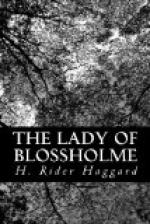The lean monk bowed, and, taking a hunch of bread, began to bite at it, for he was almost starving.
“Have you come from watching by the body of that bloody and rebellious man who has worked us so much harm and loss?” asked the Abbot presently.
The secretary nodded, then swallowing a crust, said—
“Aye, I have been praying over him and the others. At least he was brave, and it must be hard to see one’s new-wed wife burn like a witch. Also, now that I come to study the matter, I know not what his sin was who did but fight bravely when he was attacked. For without doubt the marriage is good, and whether he should have waited to ask your leave to make it is a point that might be debated through every court in Christendom.”
The Abbot frowned, not appreciating this open and judicial tone in matters that touched him so nearly.
“You have honoured me of late by choosing me as one of your confessors, though I think you do not tell me everything, my Lord Abbot; therefore I bare my mind to you,” continued Brother Martin apologetically.
“Speak on then, man. What do you mean?”
“I mean that I do not like this business,” he answered slowly, in the intervals of munching at his bread. “You had a quarrel with Sir John Foterell about those lands which you say belong to the Abbey. God knows the right of it, for I understand no law; but he denied it, for did I not hear it yonder in your chamber at Blossholme? He denied it, and accused you of treason enough to hang all Blossholme, of which again God knows the truth. You threatened him in your anger, but he and his servant were armed and won out, and next day the two of them rode for London with certain papers. Well, that night Sir John Foterell was killed in the forest, though his servant Stokes escaped with the papers. Now, who killed him?”
The Abbot looked at him, then seemed to take a sudden resolution.
“Our people, those men-at-arms whom I have gathered for the defence of our House and the Church. My orders to them were to seize him living, but the old English bull would not yield, and fought so fiercely that it ended otherwise—to my sorrow.”
The monk put down his bread, for which he seemed to have no further appetite.
“A dreadful deed,” he said, “for which one day you must answer to God and man.”
“For which we all must answer,” corrected the Abbot, “down to the last lay-brother and soldier—you as much as any of us, Brother, for were you not present at our quarrel?”
“So be it, Abbot. Being innocent, I am ready. But that is not the end of it. The Lady Cicely, on hearing of this murder—nay, be not wrath, I know no other name for it—and learning that you claimed her as your ward, flies to her affianced lover, Sir Christopher Harflete, and that very day is married to him by the parish priest in yonder church.”
“It was no marriage. Due notice had not been given. Moreover, how could my ward be wed without my leave?”




